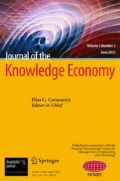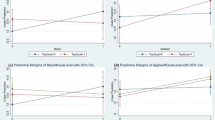Abstract
In policy debates related to innovation potential, the limited mobility from academia to industry is often explained by the supposed mismatch of skills needed in these different settings. We contribute to this debate by (1) examining the attitudes of Flemish doctoral candidates towards careers in industry, and (2) by analysing the extent to which doctoral candidates and employers in industry in Flanders differ in their views on the skills needed to perform well in this sector. We combined survey data with qualitative research. The Survey of Junior Researchers (SJR) provides information on the doctoral candidates’ perspective on these matters, whereas the Research & Development survey of Flemish companies reflects the employers’ views. Additional data obtained through interviews with both doctorate holders and employers provide a more in-depth understanding of the transition from academia to industry. A mismatch between what doctoral candidates consider important skills for a job in industry and what employers expect from researchers is observed. The importance of technical skills and more transferable competencies such as project management and business skills are underestimated by doctoral candidates. The findings raise questions on the awareness among doctoral candidates of the skills needed for a career outside academia. Addressing possible negative attitudes and providing adequate training and career planning could improve their preparation for work in non-academic settings. This is the first study in Flanders comparing researchers' and employers' views on skills, confirming findings in other countries that institutional programmes have a role to play in bridging the gap between employers' expectations and those of doctoral candidates.
Similar content being viewed by others
Notes
R= employee, researcher who is working in or is related to the R&D department of the company
E= Employer or HR-manager of one of the cooperating companies
References
Aanerud, R., Homer, L., Nerad, M., & Cerny, J. (2006). Paths and perceptions: assessing doctoral education using career path analysis. In P. L. Maki & B. Nancy (Eds.), The Assessment of Doctoral Education. Sterling, VA: Stylus.
Auriol, L. (2010). Careers of doctorate holders: employment and mobility patterns. OECD Science Technology and Industry Working Paper 2010/4. OECD Publishing. Retrieved from http://ideas.repec.org/p/oec/stiaaa/2010-4-en.html
Becher, T., & Trowler, P. R. (2001). Academic tribes and territories. Berkshire: SRHE and Open University Press.
Béret, P., Giret, J., and Recotillet, I. (2003). Trajectories from public sector of research to private sector: an analysis using French data on young PhD graduates. 15th Annual meeting on Socio-Economics, SASE (Society for the advancement of socio-economics) Aix-en-Provence: 26–28 juni 2003.
Borrell-Damian, L., Brown, T., Dearing, A., Font, J., Hagen, S., et al. (2010). Collaborative doctoral education: University-industry partnerships for enhancing knowledge exchange. High Educ Pol, 23, 493–514.
Bourdieu, P. (1984). Homo academicus. Paris: Ed. de Minuit.
Cryer, P. (1998). Transferable skills, marketability and lifelong learning: the particular case of postgraduate research students. Stud High Educ, 23(2), 207–216.
Delamont, S., Atkinson, P., & Parry, O. (2000). The doctoral experience: success and failure in graduate school. London: Falmer Press.
Department of Education, Training & Youth Affairs (2000). Employer satisfaction with graduate skills. Accessed on 21/01/2011 on: http://www.dest.gov.au/archive/highered/eippubs/eip99-7/eip99_7pdf.pdf
ECOOM-KULeuven (2008). Vragenlijst Onderzoek en Ontwikkeling in Vlaamse bedrijven. [dataset]. KULeuven: ECOOM
ECOOM-UGent. (2008). Survey of junior researchers. [dataset]. Gent: ECOOM.
Enders, J. (2004). Research training and careers in transition: a European perspective on the many faces of the Ph.D. Stud Contin Educ, 26, 419–429.
Enders. (2005). Border crossings: research training, knowledge dissemination and the transformation of academic work. High Educ, 49, 119–133.
Etzkowitz, H., Webster, A., Gebhardt, C., & Terra, B. R. C. (2000). The future of the university and the university of the future: evolution of ivory tower to entrepreneurial paradigm. Res Policy, 29, 313–330.
European Commission (2000). The Lisbon European Council—an agenda for economic and social renewal for Europe. Press Release. Retrieved from http://europa.eu/rapid/press-release_IP-00-191_en.htm
European Commission (2010). Europe 2020 Flagship initiative: Innovation Union. COM (2010) 546 final. Communication from the Commission to the European Parliament, the Council, the European Economic and Social Committee and the Committee of the Regions.
European University Association (2007). Doctoral programmes in Europe's universities: achievements and challenges. Report prepared for European universities and ministers of higher education. Brussels: European University Association.
Evans, L. (2011). The scholarship of researcher development: mapping the terrain and pushing back boundaries. Int J Res Dev, 2(2), 75–98.
Fox, M., & Stephan, P. (2001). Careers of young scientists: preferences, prospects and realities by gender and field. Soc Stud Sci, 31(1), 109–122.
Garcia-Aracil, A., & Van der Velden, R. (2008). Competencies for young European higher education graduates: labor market mismatches and their payoffs. High Educ, 55, 219–239.
Gilbert, G., Balatti, J., Turner, P., & Whitehouse, H. (2004). The generic skills debate in research higher degrees. High Educ Res Dev, 23, 375–388.
Grande, C., Hoedemakers, S., Jidkova, A., Leyman, G., der Goten, V., et al. (2009). Onderzoekscarrières in Vlaanderen: instroom, doorstroom en uitstroom van doctoraatsonderzoek. In K. Debackere & R. Veugelers (Eds.), Vlaams indicatorenboek 2009 (pp. 45–52). Brussel: Vlaamse Overheid.
Hakala, J. (2009). The future of the academic calling? Junior researchers in the entrepreneurial university. Higher Education, 2009, 173–190.
Harfi, M. & Auriol, L. (2010). Les difficulté d’insertion professionnelle des docteurs: les raisons d’une “exception française”. Notes d'analyse 189: Centre d’analyse stratégique. Retrieved from http://www.oecd.org/fr/sti/inno/48413317.pdf
Harman, K. M. (2008). Challenging traditional research training culture: industry-oriented doctoral programs in Australian cooperative research centres. In J. Välimaa & O. Ylijoki (Eds.), Cultural perspectives on higher education. Dordrecht: Springer
Hills, J. M., Robertson, G., Walker, R., Adey, M. A., & Nixon, I. (2003). Bridging the gap between degree programme curricula and employability through implementation of work-related learning. Teach High Educ, 8, 211–231.
Jackson, C. (2007). Recruiting PhDs: what works? (p. 2007). Cambridge: CRAC.
Jacobs, S., Vandevelde, K., Groenvynck, H., Van der Goten, G., Leyman, A. et al. (2010). Basisindicatoren HRRF. Gent: ECOOM-UGent.
Kehm, B. (2007). Quo Vadis doctoral education? New european approaches in the context of global changes. Eur J Educ, 2, 307–319.
Kellerman, P. (2001). Acquired competences and job requirements. Views and experiences in comparative perspectives. In U. Teichler (Ed.), Careers of University Graduates (pp. 115–130). Dordrecht: Springer.
Leyman, A., De Grande, H., Jidkova, S., Van der Goten, G., Jacobs, S., De Boyser, K., & Vandevelde, K. (2009). OnderZOEKEN = OnderVINDEN. Resultaten van de 'Survey of Junior Researchers' aan de UA, UGent, UHasselt en VUB. Gent: ECOOM.
MacDonald, C., & Barker, D. (2000). Post PhD - What next? A follow-up study of PhD postgraduates of the school of biological sciences. Manchester: University of Manchester.
Manathunga, C., Lant, P., & Mellick, G. (2007). Developing professional researchers: research students’ graduate attributes. Stud Contin Educ, 29(1), 19–36.
McCarthy, M. & Simm, J. (2006). Survey of employer attitudes to postgraduate researchers. The career service.
Morgavi, A., McCarthy, M. & Metcalfe, J. (2007a). Employers' views of researchers' skills: A comprehensive review of the existing literature into employers' views of the skills of early career researchers. UK Grad.
Morgavi, A. C., McCarthy, M. & Metcalfe, J. (2007b) Employers’ views of researchers’ skills. London: the Rugby Team & UK GRAD Programme.
Morris, H. & Cushlow, R. (2000). North west employers’ needs and expectations of postgraduate skills. ‘‘An holistic approach to labour market intelligence in higher education strategic planning. As quoted in Morgavi, A.C., Mc Carthy, M. & Metcalfe, J. (2007) Employers’ views of researchers’ skills. London: the Rugby Team & UK GRAD Programme.’’
OECD, Unesco, Eurostat (2012). Indicators on the situation of doctorate holders in 2009. Accessed on 20-12-2012. www.oecd.org/sti/cdh
Orpen, C. (1994). The effects of organizational and individual career management on career success. Int J Manpow, 15, 27–37.
Purcell, K., Elias, P., Durbin, S., Davies, R., & Warren, S. (2008). The employment of social science PhDs in academic and non-academic jobs: research skills and postgraduate training. Swindon: Economic and Social Research Council.
Roberts, G. (2002). SET for Success: The supply for people with science, technology, engineering and mathematics skills. Accessed on 10-6-2009 on http://www.hm-treasury.gov.uk/documents/enterprise_and_productivity/research_and_enterprise/ent_res_roberts.cfm
Rubio, M., & Hooley, T. (2010). Recruiting researchers: survey of employer practice 2009. Cambridge: CRAC.
Rudd, E., Nerad, M., Morrison, E., & Picciano, J. (2008). Professional development for PhD students: do they really need it? Seattle, WA: CIRGE: University of Washington.
Schwabe, M. (2011). The career paths of doctoral graduates in Austria. Eur J Educ, 46(1), 153–168.
Sten, S. (2008). Mapping of the PhDs in the private sector. A literature review. Helsinki: ETLA.
Teichler, U., & Kehm, B. M. (1995). Towards a new understanding of the relationships between higher education and employment. Eur J Educ, 30(2), 115–132.
The Gallup Organization (2010). Employers’ perception on graduate employability. Flash Eurobarometer 304. Retrieved from http://ec.europa.eu/public_opinion/flash/fl_304_en.pdf
Thompson, J., Pearson, M., Akerlind, G., Hooper, J., & Mazur, N. (2001). Postdoctoral training and employment outcomes. Department of Employment, Education, Science and Training, Evaluation and Investigations Program (Canberra).
UK Grad Programme (2001). Joint statement of the UK research councils' training requirements for research students. Accessed on 1-7-2009 on http://www.vitae.ac.uk/CMS/files/upload/RCUK-Joint-Skills-Statement-2001.pdf
Usher, R. (2002). A diversity of doctorates: fitness for the knowledge economy? High Educ Res Dev, 21, 143–153.
Vandevelde, K. (2009). Doctoreren of een doctoraatsdiploma halen? In R. Van Rossem, K. Vandevelde, & H. De Grande (Eds.), Kennis in wording (Vol. HR2, pp. 92–102). Gent: Het Vlaamse onderzoeks- en innovatiepotentieel.
VITAE (2009). Employers' briefing: targeting the postgraduate and researcher market. Employer Network Newsletter June 2009.
VITAE (2010). What do researchers do? Doctoral graduate destinations and impact three years on. UK: CRAC. Retrieved from http://www.vitae.ac.uk/CMS/files/upload/WDRD_3_%20years_%20on_soft%20copy.pdf
VRWB. (2008). Duurzame welvaart en welzijn door wetenschap en innovatie. Memorandum 2009–2014. Brussels: VRWB.
Author information
Authors and Affiliations
Corresponding author
Appendix
Appendix
As mentioned in the ‘Data and Method’, we used five sets of skills, which are similar to the skills list composed by the UK Grad Programme and Rudd et al. These were completed with additional skills characterized as important by employers and graduates in Flanders.
UK Grad programme | Rudd et al. | ECOOM | |
|---|---|---|---|
Research skills and techniques | |||
Research skills | x | x | |
Scientific knowledge | x | ||
Analytical thinking | x | ||
Technical skills | x | ||
Teaching skills | x | ||
Working with others | |||
Teamwork | x | ||
Social skills | x | ||
Dealing with diversity | x | ||
General management | |||
Leadership | x | ||
Project management | x | ||
Business skills | x | ||
Career planning | x | ||
Knowledge about IP | x | ||
Financial management | x | ||
Communication skills | |||
Presentation skills | x | x | |
Language acquisition | x | ||
Networking | x | ||
Negotiation skills and persuasion | x | ||
Writing skills | x | x | |
Personal effectiveness | |||
Independence | x | ||
Taking initiative | x | ||
Learning ability | x | ||
Stress management | x | ||
Self-confidence | x | ||
Flexibility | x | ||
Time management | x | ||
Dealing with failures | x |
Rights and permissions
About this article
Cite this article
De Grande, H., De Boyser, K., Vandevelde, K. et al. From Academia to Industry: Are Doctorate Holders Ready?. J Knowl Econ 5, 538–561 (2014). https://doi.org/10.1007/s13132-014-0192-9
Received:
Accepted:
Published:
Issue Date:
DOI: https://doi.org/10.1007/s13132-014-0192-9




